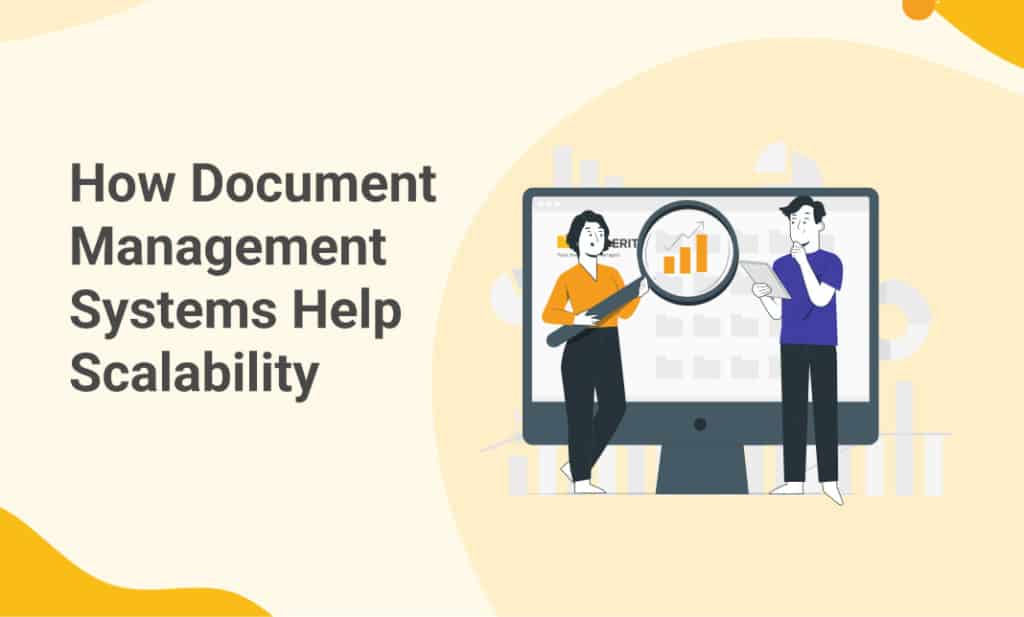Businesses are constantly seeking ways to streamline operations, improve efficiency, and foster growth. One such avenue that has been gaining significant traction is the use of Document Management Systems (DMS).
The global DMS market size, valued at USD 5.52 billion in 2022, is projected to grow to a staggering USD 18.97 billion by 2030, exhibiting a CAGR (Compound Annual Growth Rate) of 17.2% during the forecast period. This impressive growth is a testament to the increasing recognition of the benefits that DMS brings to businesses, particularly in terms of scalability.
The Scalability Advantage of DMS
Scalability, in the context of business, refers to the ability of a system, network, or process to handle a growing amount of work or its potential to accommodate growth. It’s about being able to expand without being hampered by your existing system or needing to make significant changes to it.
In the case of DMS, scalability means the system can handle an increasing number of documents, users, and workflows as the business grows. It’s about being able to add new features and capabilities as the need arises, without disrupting the existing operations.
The Role of DMS in Business Growth
As businesses grow, so does the volume of their documents. Managing these documents manually can be a daunting task, often leading to inefficiencies, errors, and bottlenecks. This is where DMS comes in. It automates the document management process, making it easier to store, retrieve, and share documents. This not only improves efficiency but also frees up resources that can be used for more strategic tasks.
Moreover, DMS also facilitates better collaboration among team members. It allows multiple users to access and work on the same document simultaneously, regardless of their location. This is particularly beneficial for businesses with multiple offices or those that employ remote workers.
The Impact of DMS on Operational Efficiency
One of the key benefits of DMS is its ability to improve operational efficiency. By automating routine tasks, it reduces the time and effort required to manage documents. This leads to faster turnaround times, improved productivity, and ultimately, cost savings.
For instance, a DMS like Folderit can use custom metadata to classify and index documents, making it easier to search and retrieve them. This eliminates the need to manually sift through piles of documents, saving employees valuable time that can be used for more productive tasks.
The Security Advantage of DMS
In today’s digital age, data security is of paramount importance. DMS provides robust security features that protect sensitive business documents from unauthorized access and data breaches. It allows businesses to control who can access certain documents and track all activities related to them. This not only enhances data security but also aids in regulatory compliance.
Regulatory Compliance and DMS
Regulatory compliance is a significant concern for businesses, especially those in highly regulated industries such as healthcare, finance, and legal. Non-compliance can result in hefty fines, legal consequences, and damage to the company’s reputation. DMS simplifies compliance by providing features like access control, audit trails, and retention policies. For instance, Folderit’s full audit trails maintain a history of all system events, allowing businesses to easily monitor and document compliance.
DMS and Disaster Recovery
In the event of a disaster, be it natural or man-made, businesses risk losing critical documents. However, with DMS, documents are stored digitally and backed up regularly, ensuring they can be recovered quickly and easily. Folderit takes this a step further by ensuring data reliability through triple backups in three separate locations, each at least 100 km apart. This provides an added layer of security and peace of mind for businesses.
DMS and Environmental Sustainability
By reducing the need for physical documents, DMS contributes to environmental sustainability. It minimizes paper usage, thereby reducing deforestation and energy consumption associated with paper production. Moreover, it reduces the physical space required for document storage, further decreasing the carbon footprint.
The Future of DMS
The future of DMS looks promising, as Mordor Intelligence projected that the market size is expected to grow from USD 6.57 billion in 2023 to USD 12.94 billion by 2028, at a CAGR of 14.50% during the forecast period. This growth is driven by advancements in technology and the increasing adoption of cloud-based solutions.
The global file-sharing software market size is also projected to grow at 24.8% CAGR from 2017 to 2023 (Market Research Future, 2019), indicating a growing trend towards collaboration and information sharing.
Scaling with Folderit
When it comes to scalability, Folderit stands out with its robust features designed to support business growth. Its OCR content indexing allows for efficient document retrieval, not just by filename or metadata, but by content. This feature supports multiple languages, making it ideal for businesses operating in multilingual environments.
Folderit’s custom metadata feature allows businesses to add custom fields of varying data types, which can be used as search parameters. This enhances the searchability of documents, making it easier for users to find the information they need.
Moreover, Folderit’s approval & eSign workflows automate processes for approval, acknowledgment, and DocuSign signatures based on folder activity or single-use basis. This not only streamlines workflows but also ensures consistency and accuracy.
Embrace Scalability with DMS
In conclusion, Document Management Systems are a powerful tool for businesses seeking to scale. They streamline document management, improve operational efficiency, enhance data security, aid in regulatory compliance, and contribute to environmental sustainability.
With the DMS market poised for significant growth in the coming years, now is the time for businesses to leverage this technology to facilitate their growth and scalability. And with a solution like Folderit, which offers a host of features designed to support scalability, businesses are well-equipped to navigate their growth journey.



